Have you ever wondered about the enchanting sounds Maine Coon cats make? These large felines are not only known for their impressive size and beautiful, lion-like manes but also for their unique vocalizations.
Unlike the typical cat meow, Maine Coon cats lean towards a more melodious concoction of chirps, trills, and occasionally, the classic meow. Understanding these sounds can significantly enhance the bond between cat and owner, letting humans “speak” the language of their furry Maine Coon companions.
Maine Coon cats are indeed vocal, but their repertoire extends beyond the usual cat noises. They are known for communicating their needs, desires, and emotions through an array of sounds. From the soft chirping that signals happiness or the desire for attention, to trills that seem to guide their human friends to whatever has caught their fancy, these sounds are rich with meaning. Recognizing and responding to these vocalizations not only satisfies the cat’s needs but strengthens the mutual bond.
This guide will dive into the symphony of Maine Coon cat noises, exploring why they vocalize, what these sounds mean, and how owners can best respond to their feline friend’s chatter. Whether you’re a new Maine Coon cat owner or looking to deepen your understanding of these magnificent creatures, understanding their unique language of chirps, trills, and meows will open up a new dimension in your relationship.
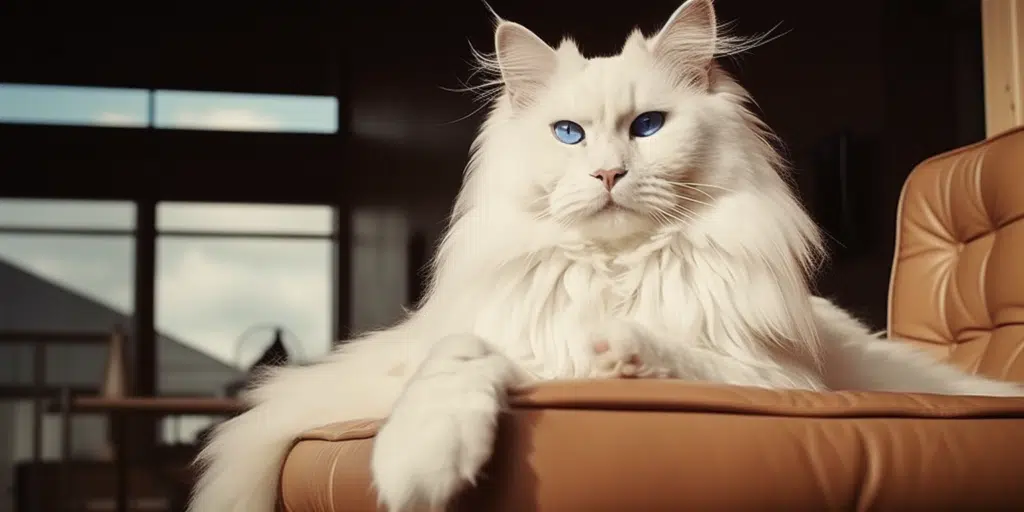
Are Maine Coon Cats Vocal Cats?
Yes, Maine Coon cats are indeed very vocal. Their vocalizations range from soft chirps and trills to the more traditional meows and howls, each carrying its own set of meanings and purposes. Unlike many other cat breeds, Maine Coon cats rarely use a “true” meow. Instead, they prefer a complex catalogue of chirps and trills to express their needs, desires, and emotions.
Some Maine Coons might naturally be more talkative than others. Their activity and exercise levels also influence their vocal behavior; a well-engaged Maine Coon, entertained with toys and interaction, may vocalize less out of boredom or frustration.
It’s fascinating to note that Maine Coon cats use their voices as tools to communicate directly with their owners. They might lead you to the empty food bowl, chirp happily when greeted, or trill as an invitation to play.
Understanding these vocal cues allows owners to meet their Maine Coon’s needs more effectively, fostering a happier and healthier cat.
Factors That Influence Maine Coon Sound Levels:
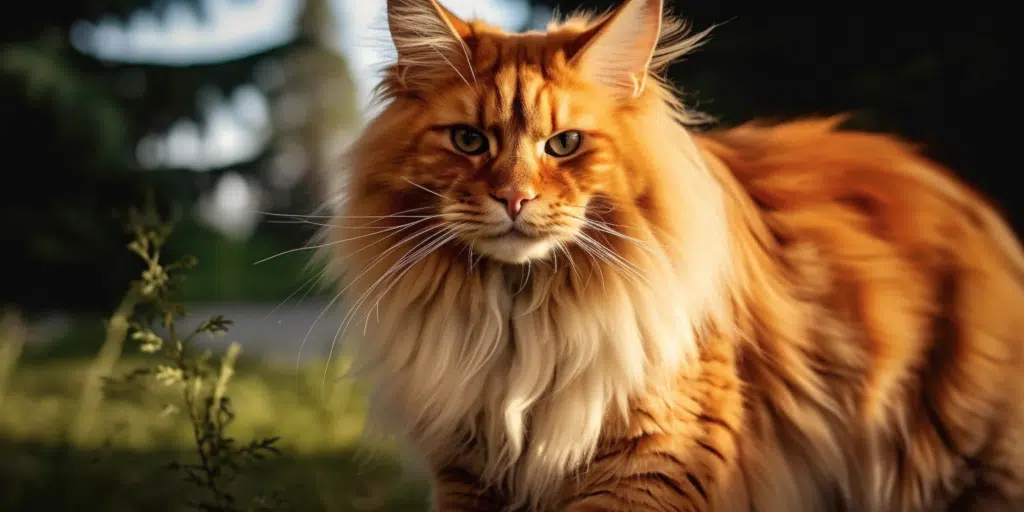
Their Age
Young Maine Coon kittens may vocalize more frequently as they explore their environment and learn to communicate their needs. As they grow into adolescence, their vocalizations might increase in volume and frequency, especially if they are vying for attention or announcing their sexual maturity.
However, as Maine Coons mature into adulthood, their vocal patterns become more refined, often chirping and trilling more selectively, communicating in a way that reflects their evolving needs and experiences.
Feeding Maine Coon and Its Relation to Noise Levels
Feeding times are prime opportunities for Maine Coon vocalizations. A hungry Maine Coon may meow insistently or chirp softly to remind you it’s mealtime. Conversely, a cat that’s been fed and satisfied will likely be quieter, content in its well-fed serenity.
Establishing a routine feeding schedule can help manage and predict your Maine Coon’s vocal demands, keeping the peace and ensuring your pet’s needs are met efficiently.
Maine Coon Exercise Level Affects Their Noise Levels
An active, well-exercised Maine Coon is generally a quieter one. Exercise and play are not only essential for their physical health but also for their mental well-being. Engaging in regular play sessions decreases the likelihood of vocalizations borne out of boredom or pent-up energy.
Dedicating time to entertain and physically challenge your Maine Coon can lead to a more harmonious home, with vocalizations more likely to be of the contented, conversation-starting variety.
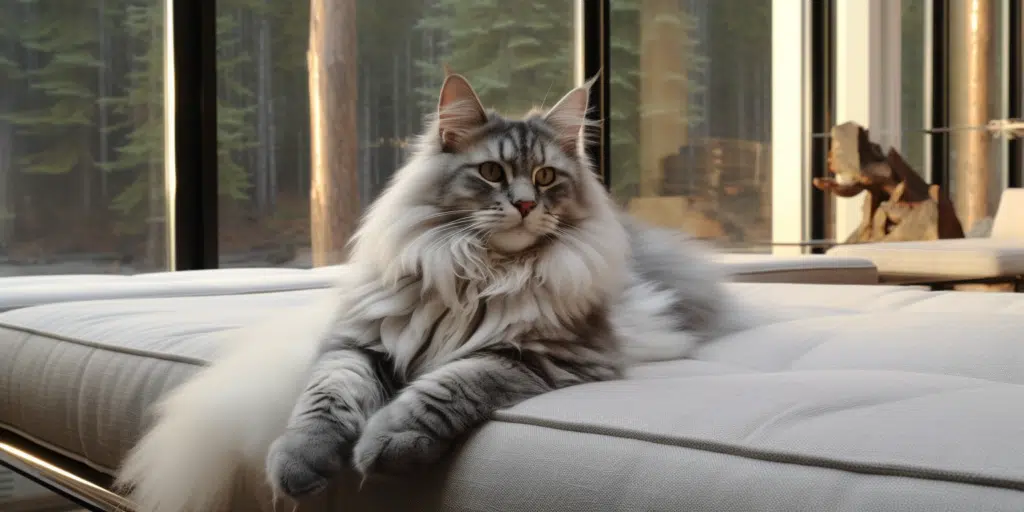
Medical Conditions
It’s crucial to recognize when increased vocalization might indicate underlying health issues. A Maine Coon that suddenly becomes more vocal with howls or yowls might be in pain or experiencing distress.
Abnormal noises, like persistent growling or hissing, could also signal discomfort or illness. Regular veterinary check-ups are essential to ensure that any unusual increase in vocal behavior is addressed promptly, maintaining your Maine Coon’s health and happiness.
Maine Coon Noises and Their Meaning
Understanding the diverse range of Maine Coon cat noises is crucial for owners. These sounds are not just adorable quirks; they are meaningful communications that, when correctly interpreted, can significantly enhance the relationship between cat and human.
Meow (The Most Common Noise)
While true meows are rare in Maine Coons, they do occur, especially when your cat is seeking attention or indicating hunger. A meow can be a greeting or a sign that your cat needs something – be it food, affection, or just to alert you to their presence.
Recognizing the context of the meow can help you respond more effectively to your cat’s needs.
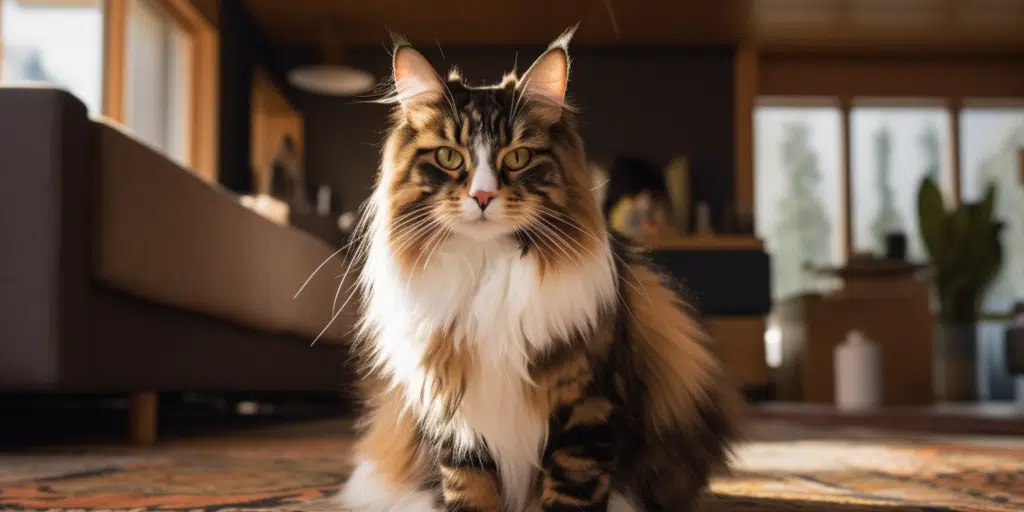
Purring (The Most Enjoyable Cat Noise)
A purring Maine Coon is a content Maine Coon. This soothing sound often signifies happiness and affection, although it can also indicate hunger or, surprisingly, discomfort.
Observing the circumstances around your cat’s purring can provide insights into its well-being and mood, fostering a deeper understanding and connection.
Hissing (Your Cat Feels In Danger)
Hissing is a universal cat language for discomfort, fear, or assertion of territory. If your Maine Coon hisses, it’s a clear sign to take a step back and assess the situation.
This noise often indicates that your cat feels threatened or is in pain, calling for a soft, cautious approach to address the root of the agitation.
Yowl (Not a Happy Meow)
A yowl is a loud, prolonged sound, usually expressing distress, frustration, or loneliness. In Maine Coons, yowling might indicate health issues or emotional distress.
Identifying the cause of yowling is essential for comforting your cat and ensuring its needs are met.
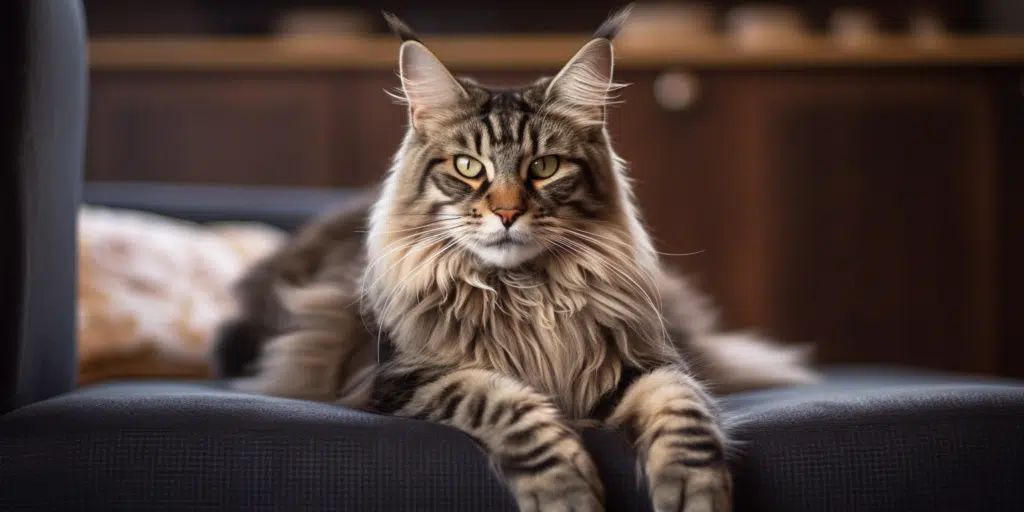
Growls (Not as Scary as a Tiger)
Growling in Maine Coons can signify discomfort or annoyance. Although less intimidating than a tiger’s roar, a growl communicates a clear message to maintain distance. Respecting your cat’s space and seeking to understand the source of its discomfort can help alleviate the situation.
Some Cats are More Talkative Than Others
Maine Coons, by their nature, are among the more vocal and social breeds. However, even within the breed, there’s a spectrum of talkativeness. Some Maine Coons might serenade you with chirps and trills throughout the day, while others prefer to express themselves more sparingly.
Factors influencing this variance include personality, upbringing, and even the level of response they receive from their human family. Engaging with the vocalizations, responding to calls, and participating in vocal play can encourage a quieter Maine Coon to open up more or help manage an over-talkative one by satisfying their social needs.
How to Make Maine Coon Less Vocal?
If you’re hoping to enjoy a more peaceful coexistence with your chatty Maine Coon, consider a few strategies. Ensure their physical needs are met promptly – a full belly and a clean litter box can reduce complaint-driven vocalizations.
Fulfill their social needs through regular interaction and play, and maintain a routine to bolster their sense of security, potentially reducing nocturnal chatter.
Lastly, understanding and responding to your Maine Coon’s sounds can preemptively address their demands, ensuring both cat and owner enjoy a harmonious relationship.
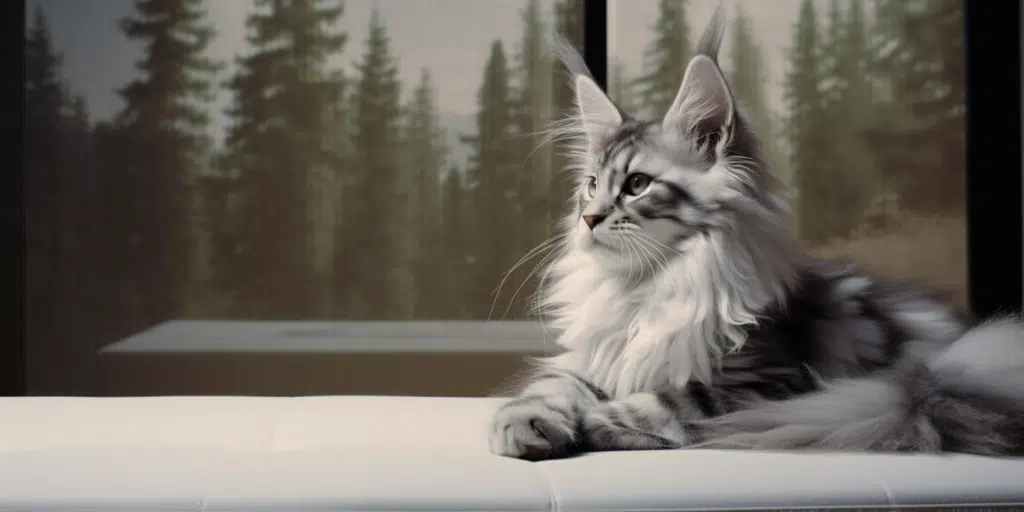
Conclusion
Maine Coon cats are indeed vocal creatures, communicating through an array of sounds each with its own meaning. Understanding these vocalizations allows owners to address their Maine Coon’s needs effectively, fostering a deeper bond between pet and human.
By recognizing and responding to chirps, trills, and even the occasional meow, you enter into a conversation with your Maine Coon, participating in a dialogue that enhances mutual understanding and affection.